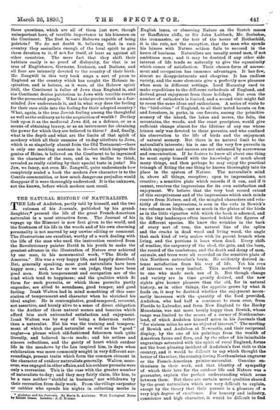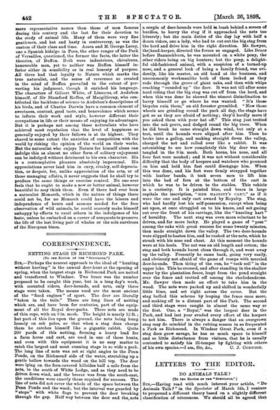THE NATURAL HISTORY OF NATURALISTS.
THE Life of Audubon, partly told by himself, and the two volumes of his Journals, published by his grand- daughter,* present the life of the great French-American naturalist in a most attractive form. The Journal of his voyage up the Missouri is now first given to the world, and the freshness of his life in the woods and of his own charming personality is not marred by any unwise editing or comment. The illustrations are excellent, worthy of a work dealing with the life of the man who used the instruction received from the Revolutionary painter David in his youth to make the greatest advance in the illustration of Nature ever achieved by one man, in his monumental work, "The Birds of America." His was a very happy life, and happily described. Bat, generally speaking, most good naturalists have been happy men ; and, so far as we can judge, they have been good men. Both temperament and occupation are of the kind which tend to happiness; and the qualities which fit them for such pursuits, or which those pursuits partly engender, are allied to soundness, good temper, and good feeling. Izaak Walton had in mind something of this asso- ciation of temperament and character when he sketched his ideal angler. He is contemplative, good-tempered, reverent, not assertive, and keenly alive to a sense of direct obligation to the Author of those natural scenes and beauties which afford him such unbounded satisfaction and enjoyment. Izaak Walton was by way of being a fisherman rather than a naturalist. But his was the training and tempera. ment of which the good naturalist as well as the " good " angler—a phrase which old-fashioned fishermen took quite literally, and believed in—is made ; and his artless and sincere reflections, and the gaiety of heart which outdoor life in the meadows by the Lea inspired him, in days when exhilaration was more commonly sought in very different sur- roundings, present traits which form the common element in the character of outdoor naturalists generally. Walton, more- over, was engaged in other affairs, and his outdoor pursuits were only a recreation. This is the case with the greater number of naturalists to-day; and they may fairly claim, like him, to be a race neither "slothful in business," nor withdrawn by their recreation from daily work. From the village carpenter or cobbler who spends his nights in collecting moths in
• Audubon and his Journals. By Maria R. Audubon. With Zoological Notes by Ellie' tt Cones. London : 3. C. Risme.
English lanes, or observing Nature on the Scotch moors or Banffshire cliffs, to Sir John Lubbock, Mr. Seebohm, the ironmaster, or the heir of the house of Rothschild, it is the rule, not the exception, that the man who spends his leisure with Nature seldom fails to succeed in the hours of business. Naturalists are usually sound men, if not ambitious men; and it may be doubted if any other side interest of life tends so naturally to give the equanimity which comes of satisfaction. Their chosen form of amuse- ment and occupation has immense advantages. It has few, almost no disappointments and chagrins. It has endless variety, and the same elements give a perfectly new pleasure when seen in different settings. Lord Macaulay used to make expeditions to the different cathedrals of England, and derived great enjoyment from those holidays. But even the number of cathedrals is limited, and a second visit might fail to rouse the same ideas and enthusiasm. A series of visits to the " bird-cities " of England, to all their noted haunts on fen and foreshore, in parks, in our forests, among the primitive scenery of the island, the lakes and meres, the fells, the mountains, the woods, and the coast precipices, would give sufficient change almost for the lifetime of any one whose leisure only was devoted to these pursuits, and who confined his observation to the life of birds and the enjoyment of natural scenery. But there is no natural limit to the naturalist's interests ; his is one of the very few pursuits in which enjoyment and success are not enhanced by narrowness and concentration. If he desires to know all about one thing he mast equip himself with the knowledge of much about many things, and then perhaps he may enjoy the practical triumph of fitting the one thing he knows thoroughly into its place in the system of Nature. The naturalist's mind is, above all things, receptive; open to impressions, not creative ; a sensitive plate which records if it can, and if it cannot, receives the impressions for its own satisfaction and enjoyment. We believe that the very best record extant of this receptiveness and of the impressions which such minds receive from Nature, and ofj the mingled characters and rela- tivity of those impressions, is seen in the cuts in Bewick's two volumes on birds,—not so much in the plates of the birds as in the little vignettes with which the book is adorned, and in the tiny landscapes often inserted behind the figures of the different species. He knew the wrinkles in the bark of every sort of tree, the natural line of the splits and the cracks in dead wood and living wood, the angle that each kind of twig makes with its parent branch when living, and the portions it loses when dead. Every shift of weather, the carpentry of the shed, the gate, and the barn, the record of the tombstone, and the death and decay of men, animals, and trees were all recorded on the sensitive plate of this Northern naturalist's brain. He evidently derived in- tense satisfaction from his way of life. Yet his area of interest was very limited. This mattered very little to one who made such use of it. But though change and variety are in time greatly desired, and the new sights give keener pleasure than the old, for in natural history, as in other things, the appetite grows by what it feeds on, it may be doubted whether the enjoyment neces- sarily increases with the quantity of the food provided. Audubon, who had half a continent to roam over, from Florida to Labrador, and from New England to the Rocky Mountains, was not more keenly happy than Bewick, whose range was limited to the moors of a corner of Northumber- land, of which Audubon himself notes in his Journals that "for sixteen miles he saw no object of interest." The meeting of Bewick and Audubon at Newcastle, and their reciprocal display, by the one of his paintings from the wealth of American fauna and flora, and by the other of his inimitable engravings saturated with the spirit of rural England, forms not the least pleasing incident of Audubon's first visit to this country, and it would be difficult to say which thought the better of the other, the country-loving Northumbrian engraver or the French-American painter-naturalist. Genuine en- thusiasm in their work, and that identity of sympathy of which their love for the outdoor life and Nature was a guarantee, explain the perfect understanding which arose between them. But there are certain moral qualities share d by the great naturalists which are very difficult to explain, except by the theory that their pursuit is a pleasure of a, very high degree of excellence. For honesty and industry, conscience and high character, it would be diffiealt to find
more representative names than those of men famous during this century and the last for their devotion to the study of animal life. Many of them were very fine gentlemen, and hot and hasty in controversy, as was the custom of their class and time. Azara and M. George Leroy, one a Spanish hidalgo in Peru, the other ranger of the Park of Versailles, questioned, the former the facts, the latter the theories, of Billion. Both were industrious, chivalrous, honourable men, yet to neither was Buffon himself in- ferior either in sensibility or in real honesty of purpose. All three had that loyalty to Nature which marks the true naturalist, and the sense of reverence so created in the mind of Buffon prevailed to the extent of per- verting his judgment, though it enriched his language. The characters of Gilbert White, of Linnwris, of Audubon himself, of Sir Stamford Raffles, of Macgillivray, who con- tributed the backbone of science to Audubon's descriptions of his birds, and of Charles Darwin have a common element of sweetness, content, good taste, and benevolence which seems to inform their work and style, however different their occupations in life or their means of enjoying its advantages. But it is perhaps not among those naturalists who have achieved most reputation that the level of happiness so generally enjoyed by their fellows is at its highest. They shared to some extent the anxieties of competition with the world by risking the opinion of the world on their works. But the naturalist who enjoys Nature for himself alone can indulge this as almost no other form of solitary enjoyment can be indulged without detriment to his own character. His is a contemplative pleasure absolutely impersonal. His appreciations never land him in envy, rivalry, self-deprecia- tion, or despair, for, unlike appreciation of the arts, or of those managing affairs, it never suggests that he shall try to produce the same things or exercise control. No one ever feels that he ought to make a new or better animal, however beautiful he may think them. Even if there had ever been a naturalist Monarch, which in the nature of things there could not be, for no Monarch could have the leisure and independence of hours and seasons needed for the free observation of wild animals, he could scarcely make himself unhappy by efforts to excel others in the indulgence of his taste, unless he embarked on a career of conquests to preserve the life of the last living pair of whales or the sole survivors of the European bison.







































 Previous page
Previous page